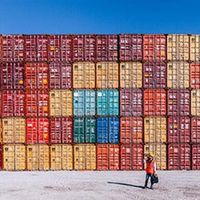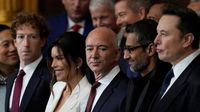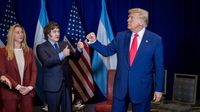On April 8, 2025, the world of finance faced unprecedented upheaval as Donald Trump’s newly imposed tariffs triggered a staggering $10 trillion (€9.2 trillion) loss in market capitalization globally. This figure, which equates to more than half of the GDP of the European Union, marks a historic moment in equity markets, raising alarms among investors and analysts alike.
During part of the trading session on April 7, the S&P 500 index, a key benchmark for the U.S. stock market, experienced three consecutive drops of 4%—a decline not seen since the Great Depression. This session-by-session collapse is the largest since the infamous Black Monday of 1987, surpassing previous downturns during the COVID-19 pandemic and the bankruptcy of Lehman Brothers. In 1987, the U.S. stock market plummeted by 26% over three days, setting a grim precedent for the current situation.
Among the hardest hit are the so-called Magnificent Seven tech giants—Apple, Google, Nvidia, Meta, Amazon, Microsoft, and Tesla—who collectively lost €1.5 trillion since April 3. The leaders of five of these companies attended Trump’s inauguration, and now they find themselves grappling with the fallout from his tariff policies. Notably, Apple has suffered the most, with losses exceeding half a trillion dollars, translating to a 16.8% drop in value. Nvidia follows with a loss of $385 billion, while Amazon has seen a decline of $262 billion.
Analysts attribute Apple’s significant losses to its reliance on Asian manufacturing, which is directly impacted by the new tariffs. This has led to concerns about rising prices for its devices, as the company may have to pass on the costs to consumers. In contrast, Meta and Google, being primarily software companies, have experienced less severe losses in relative terms.
According to the wealth management group Mirabaud, this sudden volatility in the markets comes after an extended period of calm, making the recent sell-off all the more striking. The asset manager noted that private investors have fled technology stocks, with hedge funds following suit.
Beyond the tech giants, the Saudi state oil company Aramco has also felt the sting, losing €126 billion, albeit only 8% in value. Traditional U.S. economy icons, such as JP Morgan, Eli Lilly, and Berkshire Hathaway, have collectively hemorrhaged over €50 billion in just three days, showcasing the widespread impact of Trump’s tariff policies.
European companies, generally smaller than their American counterparts, have seen more modest losses. British firms like HSBC and Shell top the list of European companies affected, along with Siemens from Germany and LVMH from France. Notably, TSMC from Taiwan lost €78 billion in one session, while Samsung saw a decline of €35 billion over three days.
The market’s outlook remains grim, with no trade negotiations or concessions on the horizon. Analysts from UBS have indicated that the current spike in volatility could be long-lasting, stating, “This won’t suddenly fade away unless we start to see signs that the U.S. might not enter a recession or tariffs begin to ease.”
As the global economy grapples with these changes, reactions from world leaders have varied. Following Trump’s announcement of global reciprocal tariffs on April 2, many countries expressed their frustrations and concerns. Members of Trump’s administration distributed sheets listing tariffs and trade barriers they believe other nations impose on the U.S., alongside the new minimum tariff of 10% that would be applied universally.
Canada’s Prime Minister Mark Carney condemned the tariffs, predicting “monumental” effects on the global economy. Though Canada was not mentioned in the initial announcement, the country has faced other tariffs, particularly on its auto industry. Carney vowed to protect Canadian workers, announcing 25% tariffs on vehicles imported from the U.S. that do not comply with the USMCA.
Brazil’s President Luiz Inácio Lula da Silva remarked that he is considering “all possible actions” to respond to Trump’s measures while ensuring compliance with World Trade Organization principles. Meanwhile, Guatemala’s government indicated it would leverage existing trade agreements to counter the tariffs.
In contrast, some leaders expressed gratitude for only facing the baseline rate. Argentine President Javier Milei celebrated the tariff announcement, sharing a post on social media and thanking Trump. Chilean President Gabriel Boric expressed regret over the unilateral decision, emphasizing that the measure was not particularly directed at Chile, as the country would only face the baseline 10% tariff.
Colombian President Gustavo Petro criticized the U.S. approach, suggesting that raising tariffs could be a significant mistake, while also highlighting potential opportunities for Colombia to expand its markets. Costa Rican President Rodrigo Chaves noted that the situation could lift all boats, indicating a willingness to engage in dialogue with the U.S. to ensure access to American markets.
In the Dominican Republic, President Luis Abinader expressed a desire for better negotiation conditions regarding the tariffs. Meanwhile, Ecuador acknowledged receiving only the baseline tax, stating that the U.S. remains its main trade partner. El Salvador’s President Nayib Bukele focused on long-term thinking in response to the tariffs, while Guatemalan officials pointed out that the tariffs violate the CAFTA-DR free trade agreement.
Mexico’s President Claudia Sheinbaum announced plans for a “comprehensive program” regarding the tariffs, emphasizing the importance of maintaining a respectful relationship with the U.S. In Nicaragua, Vice President Rosario Murillo stated that they would analyze the consequences of the tariffs, noting that Nicaragua received higher reciprocal tariffs than the baseline rate.
The situation has left many countries navigating a complex landscape of trade relationships and economic strategies. As the world watches the unfolding consequences of Trump’s tariff policies, the potential for a significant shift in global trade dynamics looms large.






